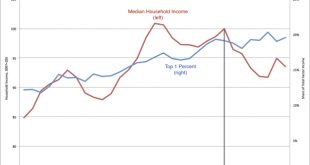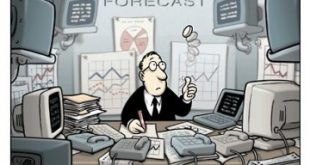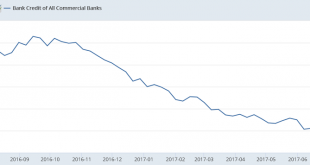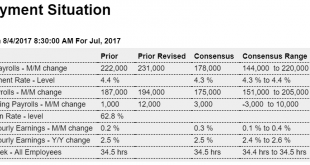Read More »
France’s malaise doesn’t keep it from employing a larger share of prime-age workers than U.S.
from Dean Baker It’s standard practice in news stories to refer to France’s economy as a basket case. The NYT went this route in an article on President Emmanuel Macron’s efforts to rewrite the country’s labor laws. The article refers to Macron’s efforts to “revitalize” the French economy and then tells readers: “The code is regarded by many as the wellspring of the country’s malaise and the chief obstacle to generating jobs, leaving the country with an unemployment rate that...
Read More »How rigged markets make the rich richer
from Lars Syll Markets are never just given. Neither God nor nature hands us a worked-out set of rules determining the way property relations are defined, contracts are enforced, or macroeconomic policy is implemented. These matters are determined by policy choices. The elites have written these rules to redistribute income upward. Needless to say, they are not eager to have the rules rewritten — which means they also have no interest in even having them discussed. But for progressive...
Read More »Disappearance of borrowers finally recognized after 2008
from Richard Koo Until 2008, the economics profession considered this kind of contractionary equilibrium (the world of $500) brought about by a lack of borrowers to be an exceptionally rare occurrence—the only recent example was the Great Depression, which was triggered by the stock market crash in October 1929 and during which the US lost 46 percent of nominal GNP in the process described above. Although Japan fell into a similar predicament when its real estate bubble burst in 1990, its...
Read More »Lost decade?
from David Ruccio Narayana Kocherlakota, professor of economics at the University of Rochester and past president of the Federal Reserve Bank of Minneapolis, is right: in some ways, the 2007-08 was worse than the Great Depression. It certainly has been worse for average households in the United States. Real median household income (the red line in the chart above) is still below what it was in 2007—and lower still from what it was even earlier, in 1999. But it hasn’t been a lost decade...
Read More »The conundrum of unknown unknowns
from Lars Syll Short-term weather forecasting is possible because most of the factors that determine tomorrow’s weather are, in a sense, already there … But when you look further ahead you encounter the intractable problem that, in non-linear systems, small changes in initial conditions can lead to cumulatively larger and larger changes in outcomes over time. In these circumstances imperfect knowledge may be no more useful than no knowledge at all. Much the same is true in economics and...
Read More »Credit check
Possibly bottoming at much lower rates of growth: Still heading lower: Is the deceleration in borrowing reflecting a deceleration in spending?
Read More »Progressive mobilization in Europe
from Jayati Ghosh Meetings of global leaders – such as recently occurred in the G20 meeting at Hamburg – increasingly have a ring of farce about them. The inability to come to agreement on pretty much anything of significance is leavened only by sideshows and media obsession with which global leader met with whom for how long, who sat in for which President at the “high table”, and similar trivia. Meanwhile, there is abject failure on the part of these leaders to recognize the pressing...
Read More »Employment, Trade, M2, Public employment, Rig count
More than the entire gain in civilian employment seems to have been via part time work: Highlights The second half of the year opens on a strong note as nonfarm payrolls rose 209,000 in July, far above Econoday’s consensus for 178,000. The unemployment rate moved 1 tenth lower to 4.3 percent while the participation rate rose 1 tenth to 62.9 percent, both solid positives. And a very strong positive is a 0.3 percent rise in average hourly earnings though the year-on-year rate,...
Read More » Heterodox
Heterodox






